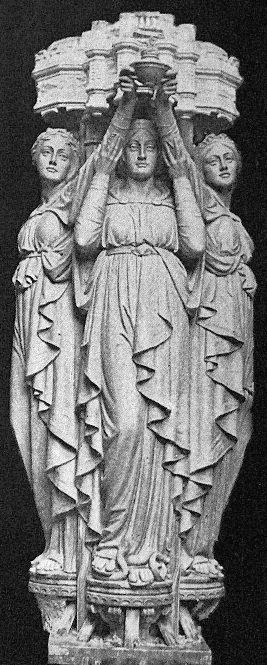
Courtesy of http://www.speel.me.uk/gp/caryatids.htm
The bank paid off one of my certificates of deposit (CD) early to refinance at a lower rate. My broker suggested one of two things: 1) buy a 3-month Treasury that paid 5% interest, or 2) a one-year Note that paid 4.5%. I chose the longer Treasury despite the lower rate. If the Federal Reserve Bank reduces interest as expected, I reasoned more banks would refinance their CDs. A Treasury with a secured amount for one year seemed like the better deal. My broker agreed, saying “Less is more.” Then, he broke into his usual rant against the national debt.
I gave him a sympathetic grunt though I didn’t share his fears. Our government securities have long been a haven for foreign investments. How much or how little we fund our government with that currency is a legitimate question but as long as we remain a stable democracy, sovereign nations will flock to the dollar as a haven for their money. During the 2008 global financial crisis, even the Bank of England and the European Central Bank relied upon our Treasuries. (“Top Dollar,” by Eswar Prasad, Foreign Affairs, July/Aug. 2024, pg. 106.)
The reason our currency is strong is threefold: 1) we have an independent Federal Reserve; (2) we live by the rule of law, and (3) we have stability because our government has a system of checks of balances. Because of these three virtues, the U. S. dollar dominates nearly half of all international trade. (Ibid, pg 104)
As if blind to our financial worthiness, several U. S. oligarchs have embraced Donald Trump’s proposal to reduce our debt with tariffs rather than to raise taxes. His plan may save them money in the short run, but in the long run, tariffs will chip away at the three foundational pillars that keep the dollar strong.
The effects won’t be felt overnight, but tariffs make foreign products expensive and serve as a tax on the consumer. Trump tried tariffs in his first term as President and harmed our export and import finances, as a result. Simply put, when the consumer stopped spending, jobs and wages declined.
Oligarchs can weather downturns and even scoop up bargains when the stock market plummets. Working people and pensioners don’t have that resiliency. They can’t “play with money.” They use it to survive—which is why the Supreme Court ruling in Citizens United dealt an earlier blow to the three financial pillars of democracy. When the conservative Court defined corporations as people, money gushed into political campaigns, gave it a disproportionate voice, and nearly obliterated the premise of one person one vote. With enough money, some in Congress could be bought.
To be fair, influence peddling isn’t new nor restricted to a particular political party. We lost one of our greatest presidents, Joe Biden, because oligarchs like Abigail Disney, a person who inherited her wealth rather than earned it, decided she would not support the 2025 Democratic campaign if Biden headed the ticket.
When I read the news, Shakespeare’s words came to mind. Who is Abigail Disney or I to her that she should speak for me? Or, any movie star? Again, Citizens United is the reason they do speak, and louder than the average person.
I admit to being giddy with the hope that Kamala Harris might break the presidential glass ceiling. Nonetheless, I am furious to see ageism unseat one of our greatest presidents, particularly when no clearer path to the White House exists for the Vice-President than it did for Joe Biden.
January 6 revealed how the Maga crowd endangers our democracy, but oligarchs pose as great a threat. Not satisfied with their attempts to dominate workers and consumers, some of them imagine that money grants them the right to dabble in international diplomacy. How else are we to understand Elon Musk’s conversation with Vladimir Putin?
If Money has the same rights as people, then it should be taxed like the rest of us. Let us hear no more about a “trickle-down” economy. The notion is insulting and a lie. The proliferation of neoliberalism in the tax code has fueled inequality. Between 1980 and 1983, real after-tax income among the bottom 50 percent declined by roughly 3 percent, while it increased by approximately 23 percent for those in the top 1 percent (Congressional Budget Office 1986). (pg. 10)
The excess of money in the hands of a few has corrupted the three financial pillars of our democracy and is raising its ugly threat even now. We may applaud Kamala Harris’ bid for the White House, but we should be aware that two of her billionaire supporters want her to remove Lina Khan as head of the Federal Trade Commission. In their opinion, she has too vigorously defended President Joe Biden’s antitrust policy.
Whatever their politics, ordinary citizens have a common cause. Citizens United must be overturned.
